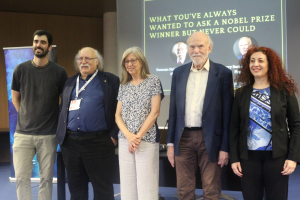Two Nobel Laureates in Physics Visit the Institute of Corpuscular Physics (IFIC)
The Institute of Corpuscular Physics (IFIC), a joint center of the Spanish National Research Council (CSIC) and the University of Valencia, had the honor of receiving a visit from two prominent figures in contemporary physics: Barry Barish and Duncan Haldane, both recipients of the Nobel Prize in Physics.
Their visit to Valencia, as part of their participation as jury members for the Rei Jaume I Prizes, was an opportunity for IFIC to organize a very special event, particularly aimed at its younger research staff: PhD students, postdoctoral researchers, and Ramón y Cajal and Gen-T fellows.
The central activity was a roundtable discussion titled What you’ve always wanted to ask a Nobel Prize winner but never could, which offered a unique chance to engage in a close and enriching dialogue with the two laureates. In an informal and participatory format, attendees were able to share their concerns about scientific careers, current challenges in fundamental physics, key decisions in professional life, and many other curiosities. Without a doubt, it was an inspiring encounter for the new generation of scientists, coordinated by IFIC’s Young Researchers Office (OJI).
About the Nobel Laureates
Barry C. Barish (California, USA, 1936) is Professor Emeritus at the California Institute of Technology (Caltech). He was awarded the Nobel Prize in Physics in 2017, along with Rainer Weiss and Kip Thorne, for their decisive contributions to the LIGO (Laser Interferometer Gravitational-Wave Observatory) detector and the first direct detection of gravitational waves in 2015, as predicted by Albert Einstein a century earlier. Barish served as director of the LIGO project and led its transformation into a large-scale international scientific collaboration, enabling the sensitivity required to detect these ripples in spacetime caused by black hole collisions. He also directed the design of the International Linear Collider (ILC) and has been actively involved in global science policy in particle physics.
Frederick Duncan M. Haldane (London, United Kingdom, 1951) is a professor at Princeton University (USA). He was awarded the Nobel Prize in Physics in 2016, together with David Thouless and Michael Kosterlitz, for their theoretical discoveries of topological phases of matter and topological transitions—fundamental advances in solid-state physics. Haldane is known for the Haldane model and the Haldane chain, concepts that revolutionized the understanding of quantum materials and paved the way for the study of topological insulators, with potential applications in quantum technologies. His work has had a profound influence on the development of new materials and the emerging field of quantum computing.
mino al estudio de los aislantes topológicos, con potenciales aplicaciones en tecnologías cuánticas. Su trabajo ha influido profundamente en el desarrollo de nuevos materiales y en el campo emergente de la computación cuántica.



















